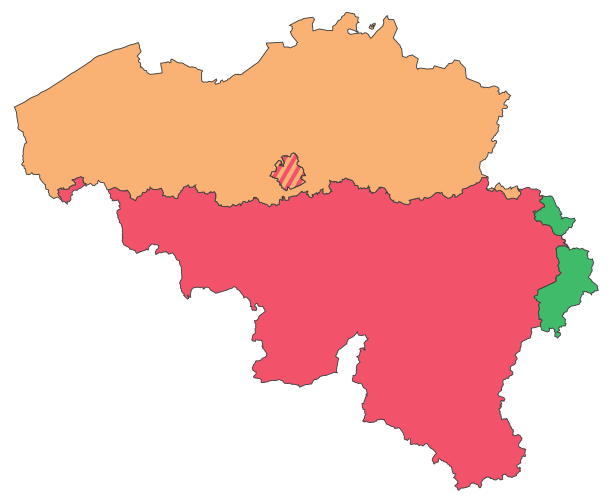
I guess most people know where France is, or Germany, or Spain. But where is Belgium? In Europe? And even though I knew where Belgium was, I had never been there. There were a few things I believed I knew about Belgium. In short: chocolate, beer, fries, and political chaos. Turns out: all true—and yet, as always, not as simple as those words might suggest.
I had the privilege of talking to natives here in Belgium. They love their country, and yet they complain about its complexity.
This complexity has a lot to do with the languages officially spoken in Belgium—Dutch, French, and German. And there are three territories where the speakers of these languages live: the country (about the size of Maryland) is divided into a French-speaking south (red on the map), a Dutch-speaking north (orange on the map), and a tiny minority of German-speaking Belgians in the east (green on the map). And in Brussels (the striped dot on the map), the capital, both French and Dutch are spoken.
In Brussels, the language issue becomes especially obvious: there is “la Friture” and there is “Frituur”—two names for the same place, the place where one can get those amazing Belgian fries. Just make sure never to order “French fries”—the Belgians insist they invented fries. And it’s true: Belgian fries are special because they are deep-fried twice. And that really does make a difference—I’ve never had fries as crispy as those!
Anyway, back to the division of the country: The three areas have their own governments and administrations, plus there is a federal government that is supposed to mediate the often difficult relationships between the regions. As a result, decisions of any kind are often not made at all—or made very late—they just can’t agree. The regions insist on their autonomy, especially when it comes to language.
Here’s an example: there was once a train conductor who made announcements in Dutch and French, while the train was passing through the Dutch-speaking part of the country. One of the passengers felt offended by the use of French and sued. A court ruled that the conductor had to change his language when in the Dutch-speaking part of the country—no announcements in French. That’s particularly problematic if a passenger who only speaks French (quite a few Belgians speak only one language) doesn’t get the info they need—in fact, the conductor is not allowed to inform the passenger in the only language he or she understands.
Sounds like a broken country? Well, it’s not. The infrastructure works just fine, public transport is excellent, and there is industry and business everywhere.
And Belgians are very friendly people, always helpful and—in an interesting way—happy to be Belgian. They talk about their country as being open-minded and cosmopolitan, and the vast majority sees the ongoing animosities between the different parts as a nuisance—often exploited by politicians to stir people up—but they don’t take it too seriously.
And don’t forget: the fries, the chocolate, and the beer are just amazing… .
Wow! We’ve been in Belgium (loved it) and had no idea about this! So fascinating to learn. Thank you so much for this article! ❤️